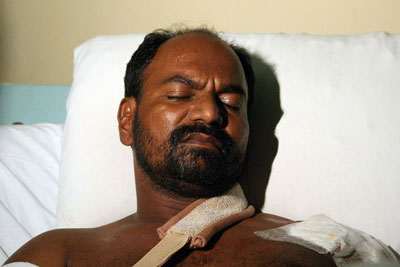|
| Help | |
| You are here: Rediff Home » India » News » First Look |
|
 He surely must be feeling sick about all the media attention he is getting. Every single journalist who visits him to get an "exclusive" peek into what he witnessed on the night of November 26 is asking him only one question: "Can you describe the incident in detail?"
He surely must be feeling sick about all the media attention he is getting. Every single journalist who visits him to get an "exclusive" peek into what he witnessed on the night of November 26 is asking him only one question: "Can you describe the incident in detail?"Meet Sub-Inspector Arun Jadhav who survived because of his presence of mind despite his body being riddled with four bullets fired from the guns of Ajmal Kasab and Abu Ismail, the terrorists who first fired indiscriminately at CST before the latter was gunned down at Chowpatty and former arrested by the police.
His superiors Mumbai Anti-Terrorism Squad chief Hemant Karkare [Images], Additional Commissioner of Police (East) Ashok Kamte and top encounter specialist Vijay Salaskar and three other police officers were not so lucky though as they fell to bullets.
"Why do you want me to narrate the same story again and again?" pleads the sub-inspector even as he remembers the incident.
Jadhav's face trembles with pain as the camera crew of a television channel switches on the light mounted on their camera.
He is traumatised by the way the media is harassing him to repeat the same thing again and again. "What's more painful than his bullet injuries is the fact that every time the reporters ask him the details of the incident he remembers those terror scenes and how his colleagues and seniors were killed in front of his eyes," says an angry colleague, Police Inspector Shette.
The media crew, including this correspondent, entered Jadhav's room after much haggling with the officers who were paying a courtesy visit to Jadhav.
Jadhav knew Salaskar from close quarters because of his close association with the encounter specialist for more than 10 years and they were like a family, Shette informs us.
He has been maintaining a strict vigil against media intrusions outside Jadhav's room ever since Jadhav started expressing his discomfiture about talking to the media.
"Can't you see the pain on his face when you try to get the details about the incident? Would you harass your own father or brother if they were in such a traumatic situation?" an exasperated Shette demands.
Earlier, in the day a stream of reporters had visited Jadhav to get the gory details of the incident. When this correspondent entered Jadhav's room after convincing his colleagues late evening he first refused to talk, anger clearly marked on his face.
"Were you unconscious after being hit by two bullets?" asks this correspondent citing news report the previous day. "I was hit by four bullets," he corrects me.
"This is the problem with reporters. I never said I fell unconscious. I feigned death so that I could eavesdrop on their conversation," replies Jadhav. Something happens to him at this point. He gets angry again and asks this correspondent to leave immediately. Once his anger subsides he speaks reluctantly.
"There were two of them. They spoke Hindi with a thick Punjabi accent. I heard them talking about our bullet-proof jackets. I was lying under the dead bodies of my colleagues soaked in blood. Later they just sat silent and drove away," says Jadhav as he remembers the traumatic scene once again and pleads this correspondent to leave him alone.
"I hope you will publish whatever has happened here today and how it is affecting Jadhav sir," says Shette. "At least he won't be disturbed hereafter if you guys behave in a responsible manner after listening to what Jadhav sir is going through and his feelings. Please learn to respect our privacy."
Photograph: Andri Tambunan
| Email | Print | Get latest news on your desktop |
|
|
| © 2008 Rediff.com India Limited. All Rights Reserved. Disclaimer | Feedback |